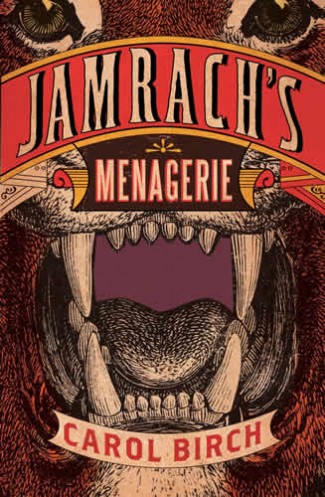 Reading the Longlist:
Reading the Longlist:
Escape from
the Tiger's Mouth
Jamrach's Menagerie
by Carol Birch
Review by Mary Rechner
Jaffy, the protagonist of Carol Birch’s Jamrach’s Menagerie, is a poor little boy, but not unhappy. He lives with his Ma among hungry prostitutes who send him out for fried fish and pickles. Ma takes in sewing, but ends don’t meet: Jaffy picks coins out of sewers and goes to bed hungry, until one day, on the wharves of London, he meets a tiger on the loose and, as Jaffy puts it, “The tiger took me in his mouth and everything truly began.”
Eating and not eating share center stage in the novel, and Birch’s delicious prose will entice even those readers (me, for example) reluctant to embark on a seafaring tale. Jaffy tells a great story—here, he remembers the tiger:
“He drew me like honey draws a wasp. I had no fear. I came before the godly indifference of his face and looked into his clear yellow eyes. His nose was a slope of downy gold, his nostrils pink and moist as a pup’s. He raised his thick white dotted lips and smiled, and his whiskers bloomed.”
Miraculously unharmed by the tiger, Jaffy becomes an animal keeper for its owner, Charles Jamrach, “Naturalist and Importer of Animals, Birds and Shells.” At Jamrach’s, Jaffy meets Tim, soon his constant companion and rival, and Tim’s twin sister, Ishbel. Ishbel is beautiful and bitten; she constantly gnaws her fingers. In this world children must work in order to eat: Jaffy labors days at Jamrach’s, nights at a tavern; Tim works for Jamrach, too; Ishbel sings and dances in a bar. Tim and Jaffy go to school for a bit to learn to read, but other than that, “everyone has to work.”
Jaffy and Tim become teenagers and then sailors when they sign to a whaling ship with a twist: a man they know from Jamrach’s, Dan Ryan, is coming along, and Dan intends to catch a dragon. For Jaffy, transition to life on the Lysander “a beauty, ageing, well preserved, small and neat” is enjoyably rough: “Ropes, ropes, a million ropes and every bloody one with its own name, and if you got the wrong one you buggered up the whole thing.” The drama of whale catching excites, but it’s the dragon on which this narrative hinges. Real events (the famed shipwreck of the Essex—Melville wrote about it too, in Moby-Dick) may have inspired Birch, but by filtering the facts through young Jaffy and through the creation of the dragon, Birch transforms history into a tale as philosophical and relevant as it is swashbuckling.
For me, however, the magic is lost along with the dragon; the bustling world that Birch has taken such pains to conjure in the first half of the novel shrinks to two small whaleboats and twelve men. Though many (if not most) readers will be held in thrall post-shipwreck (tales of deprivation have their legion fans), I felt cheated by predictable trials when the story had been so full of rich and inventive life. Jamrach’s Menagerie began to remind me too much of another Moby-Dick inspired novel, Sena Jeter Naslund’s Ahab’s Wife: Or, The Star-Gazer: A Novel. Birch’s prose never flags while describing the physical and psychic trauma of starvation, but the act of reading began to feel passive. My job description had changed: I was no longer required to co-create, but rather to stoically witness. Like Ahab’s Wife, the ending of Jamrach’s Menagerie, with its healing, forgiveness, and reunions, felt revisionist and wishful rather than wily and Victorian. Ω


